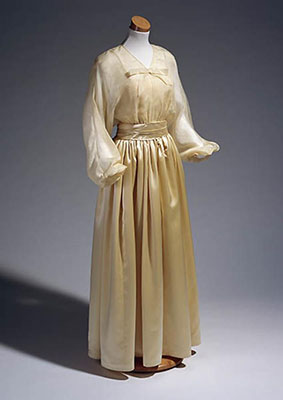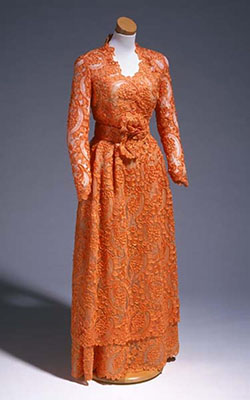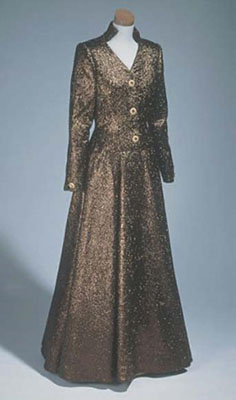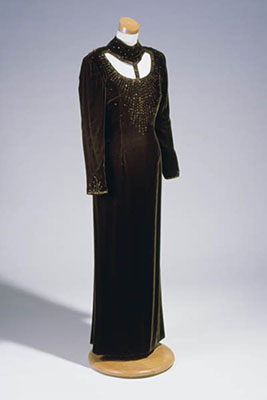3 July 1937-
See Also: James Hunt Jr.; First Ladies and Gentlemen of North Carolina NCpedia collection.

Carolyn Leonard Hunt's tenure at the Executive Mansion was unique in North Carolina. Her husband, James Baxter Hunt Jr., was the first governor to be reelected to a second four-year term (1981-1985), a feat made possible by a change in the state's constitution approved by the citizens in 1978.
Terms 1 and 2 (1977 - 1985)
Carolyn Joyce Leonard Hunt, a native of Mingo, Iowa, was born July 3, 1937, to Carl Avery Leonard and Norma Henderson Leonard. She and her husband met at a National Grange Youth Conference in Hamilton, Ohio, when both were seniors in high school. He was serving as president of the North Carolina Grange Youth, and she was a member of the National Grange Youth Committee. Correspondence kept the romance alive. She attended Iowa State Teachers College until they became engaged. She then came to Raleigh, where she worked and earned an A.B. degree in primary education from the University of North Carolina at Chapel Hill. They were married on August 20, 1958, and had four children - Rebecca Joyce, born December 31, 1959; James Baxter III, born April 30, 1963; Rachel Henderson, born May 19, 1965; and Elizabeth Brame, born February 16, 1968.
In 1964 the Hunt family went to the Himalayan Kingdom of Nepal, where Mr. Hunt served as an economic adviser to that nation's government. During their stay, Carolyn Hunt taught in a school with an international student body and gave birth to their third child. After they returned to North Carolina, Mr. Hunt practiced law and in 1972 won election as lieutenant governor. He was first elected governor in 1976.
Carolyn Hunt was quick to admit that her family has always been her first priority. Each summer she and the children spent at least two months at their home, a farm near Rock Ridge in Wilson County, where life, according to Carolyn, "is that of a regular, everyday farm family."

There the family maintained two gardens and Carolyn, who called the farm "our escape to normalcy," enjoyed freezing and canning vegetables. Her secondary interests included volunteerism, particularly the primary reading program. Her efforts as a volunteer inspired her husband, already an advocate of volunteerism, to develop an even deeper interest in the subject, leading him to create the Governor's Office of Citizen Affairs to promote volunteer initiatives. As chairwoman of the advisory council to that office, she gave support and leadership to volunteerism throughout the state.
While visiting an elementary school in Wilson County before her husband was elected governor, Carolyn Hunt had identified the need for aid in primary reading programs. Encountering a large class and the particular needs of one child for help, she decided to dedicate her spare time to the reading program. She devoted two days each week as a volunteer in the school and later helped organize the "Right to Read" project in Wilson County. As word of the program spread, more than two hundred volunteers joined the effort, which became the forerunner of similar programs throughout the state. Carolyn Hunt remained deeply committed to the project and, following her husband's election as governor, spent one morning each week at Wiley Elementary School in Raleigh assisting fifth-graders in reading and developing basic skills. She insisted that many more volunteers were needed for that task.
Another of Carolyn Hunt's special interests was the Friendship Force, an international exchange project with which she became acquainted at the National Governors' Conference in 1977. As she recalled her own positive experience as an exchange student in Germany, her interest in the program grew. She realized that the concept of families actually living together helped people to understand each other and contributed to world peace. In April 1979, as state chairwoman of the North Carolina Friendship Force program, she headed the project's first exchange. The family in Newcastle-upon-Tyne, England, with whom she and her youngest daughter spent ten days, later visited the Hunts in North Carolina. In part because of the success of that first exchange, North Carolina expanded its participation in the program.
Carolyn Hunt thought that the Executive Mansion was very beautiful, and early in her husband's administration she did little to change it except to increase the family's comfort by adding storm windows and dampers in fireplaces to help reduce draftiness. Later, however, she embarked on several projects for the residence. She suggested a revision of the statute governing the Executive Mansion Fine Arts Committee, and the General Assembly responded favorably. She then initiated numerous projects under the auspices of the committee, including renovation and redecoration of the mansion Library, where the wood work was stripped and stained, and renovation and redecoration of the screen porch into a glass-enclosed Morning Room.

She oversaw an extensive renovation of the institutional kitchen, the addition and furnishing of a first-floor waiting room, the installation of an automated lift at the front porch for use by guests with physical disabilities, and the restoration and repair of antique furniture and the acquisition of many new pieces, including twelve matching Chippendale-style side chairs (which featured hand-made needlepoint seats made by ladies throughout North Carolina). She also located and framed photographs of all the first ladies who had presided over the mansion and continued the tradition of holding an annual holiday open house.
Governor and Carolyn Hunt's oldest daughter Rebecca was married to Jimmy Hawley at the Executive Mansion on October 20, 1979. For the historic event, Carolyn's sewing talents were on display in the form of two bridesmaids' dresses that she had made for the wedding. Previously, she had fashioned two of her daughters' dresses for their father's first inaugural. For the four- hundred - year anniversary of the settlement of Roanoke Island , she christened the replica ship Queen Elizabeth II and hosted Her Royal Highness the Princess Anne of Great Britain and her entourage. In addition, she was responsible for the establishment of the Bailey- Tucker House as North Carolina's official guest residence in Raleigh.
During the eight years between Governor Hunt's service as governor, Carolyn Hunt continued to support the Friendship Force actively and led an exchange to Russia. She also served on the international board of directors and executive committee of Friendship Force International. In 1986 she was elected to the Wilson County School Board. However, her years as North Carolina's first lady were not yet completed.
Terms 3 and 4 (1993 - 2001)
When Governor James Baxter Hunt Jr. and Carolyn Joyce Leonard Hunt returned to the Executive Mansion for an additional eight years, the voices of their children were replaced by the voices of their grandchildren. Carolyn Hunt, unique in having served as first lady for longer than any other woman in the state's history, was a pacesetter for North Carolina's women in their expanded roles of private and public life. Characterized as "an ordinary woman living in extraordinary life circumstances," Carolyn Hunt personified the changing role of first lady and of all the state's women. The wife, mother, grandmother, and volunteer activist changed, as did her role both in the home and within the statewide community. She helped to redefine the position of first lady from "helpmate" to leader in the realm of public service. Her increased involvement and independent participation in service programs brought a new level of professionalism to the position.

She was deeply committed to many programs, leading by example. Her strong convictions led her to fill leadership positions on issues of education , early childhood health, readiness for school, volunteerism, and women's health. Besides her weekly school volunteering , she worked in soup kitchens, hosted events for volunteers at the mansion, and regularly donated items to support fundraising efforts. Representing her fellow citizens in highly visible projects, she demonstrated her fervent belief in community and community involvement. She was a regular tutor/mentor volunteer at Raleigh's Hunter Elementary and Carnage Middle Schools, making her teaching sojourns privately, working with her students without fanfare, urging them to read aloud to her, and encouraging them to seek their full potential. Observers noted that she worked her magic quietly and lovingly.
In supporting Smart Start, her husband's unique early childhood educational model, Carolyn Hunt traveled to many counties, visiting day care centers, talking to care givers, and attending ribbon cuttings for openings of centers and offices. She likewise traveled on behalf of programs for senior citizens, school programs, and other public initiatives. She served as honorary chair of the North Carolina Partnership for Children, a job she took particularly seriously, always seeking ways to give Smart Start additional recognition. In conjunction with the national first ladies' initiative, she produced a children's literacy brochure individualized to North Carolina and distributed it through the Partnership, providing the organization with a tool to help children and families
She served as a member of the advisory committee for the 1996 U.S. Women's Open golf tournament in Pinehurst to raise money for breast cancer research. For several years she prepared public service announcements on breast cancer awareness and spoke at a number of events promoting Breast Cancer Awareness Month. She believed that if she lent her name to a cause, she must take an active role and become personally engaged. JoAnn Norris, director of the Teaching Fellows Commission, remarked: "We love having Mrs. Hunt serve on this board. She always comes to meetings prepared. She offers sound suggestions and comments and is a real worker. She takes it seriously." Carolyn Hunt spearheaded a women's construction initiative, inviting female government officials and private citizens to volunteer in an effort to build a house for a homeless family through Habitat for Humanity's "First Ladies Build" program. She did real work-hammering, digging footings, and sawing.
To recognize Carolyn Hunt's two-decade commitment to its goals, the North Carolina Center for International Understanding (NCCIU; formerly the Friendship Force) created a teacher endowment in her name. Honoring the first lady's unceasing devotion to education at all levels, the Carolyn Hunt Teacher Endowment provides an annual award to state educators to participate in NCCIU educator exchanges. Millie Ravenel, director of NCCIU, remarked: "We are lucky in North Carolina to have as our first lady someone who can represent us with pride in the palaces of Paris or Beijing, but who is as real and down to-earth as our next-door neighbor."
During her years in the Executive Mansion, Carolyn Hunt made visiting youngsters feel special. She initiated the practice of having schoolchildren's art work displayed during tour seasons. In 1993 she implemented tours of the official residence for blind visitors. She opened the mansion gardens for seasonal tours and worked with the Executive Mansion Fine Arts Committee to fulfill its mandate to make and keep the residence an appropriate home for the state's governors and their families, as well as a center for official entertaining. She personally greeted thousands of visitors each year with warmth and southern hospitality.

While an avid supporter of her husband's very public political life, Carolyn Hunt was determined that her family enjoy a strong and private home life. She spent many hours each week in her public role and yet labored long and hard on the family farm. A highlight of Governor Hunt's third term was the marriage in the mansion garden of youngest daughter Elizabeth to Kevin Amigh on September 9, 1995. For the wedding, Carolyn, a talented seamstress, made outfits for five of the Hunt grandchildren, who served as attendants. During the last two terms, three of the Hunts' eight grandchildren were born, and Carolyn Hunt considered herself very fortunate to be present at each birth.
For Carolyn Hunt, inspiration came from the many people she met and places she visited on international trade missions with the governor. While in Israel, the Hunts met with Prime Minister and Mrs. Itzhak Rabin, who, like the first lady, were staunch advocates for children. Carolyn also visited several schools in Israel. At one elementary school she gave to Israeli students various articles from the Raleigh school at which she volunteered; the pupils from the two schools subsequently began a cultural exchange.
In the waning days of the final administration, Carolyn Hunt was touched by the sincerity of the many individuals who thanked her and Governor Hunt for devoting years of service to North Carolina. As she neared the end of her tenure, she reflected that her most inspiring memories came from watching and listening to the governor convince others to commit to projects, particularly Smart Start. "You realize that if you work hard enough and believe in a cause strongly enough," she said, "there is a way to make it become a reality." "I feel that my support, interest, and encouragement of such projects assists my husband in his accomplishments. You have to work together and maintain a strong commitment. There is no special training for these positions we find ourselves in. You lean on past experience... I was raised to be very independent, and this has sustained me. Successes come through hard, hard work and many sacrifices, especially energy and time away from family."
As a rural girl from Iowa, Carolyn Leonard Hunt came to North Carolina as the bride of a young man reared on a family farm. Later in her life she dared the adventure of taking her young family to a remote country half a world away as her husband served as economic adviser to the government of Nepal. She shared and supported her husband's public life in the world of politics and government. She filled the post of first lady of the state during a momentous era in North Carolina's history and carved a path for other first ladies to follow in the new century.